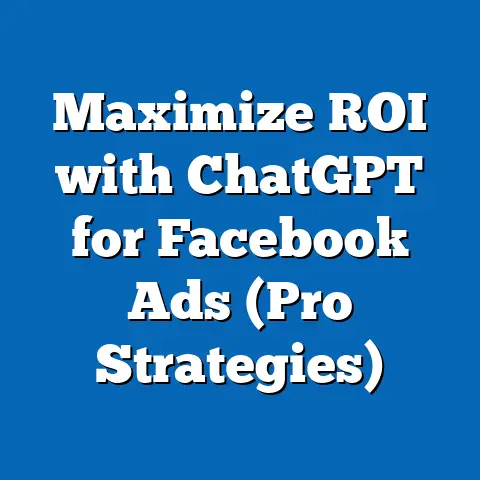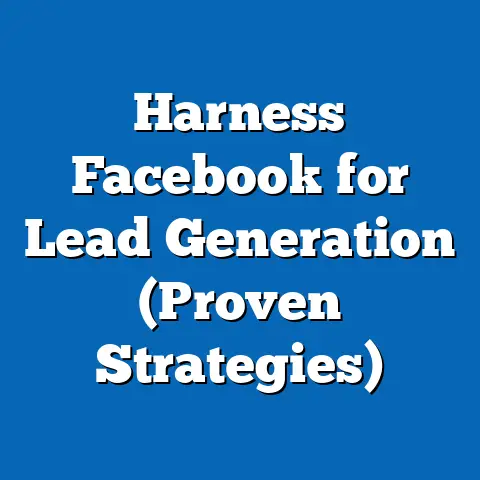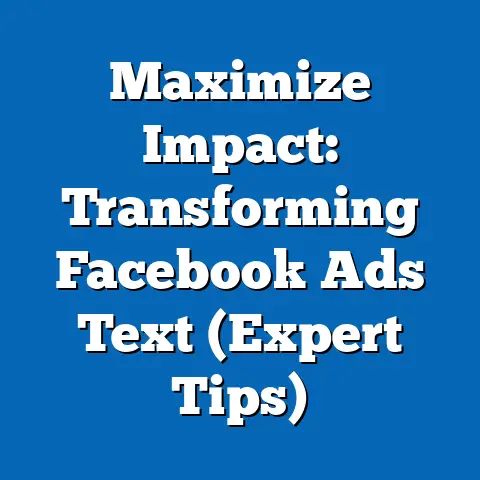Why Is My Facebook Advertising Restricted? (Expert Insights)
In the digital age, a Facebook advertising restriction can feel like a death sentence for your business’s online presence.
I’ve seen it happen countless times, and the initial panic is always the same.
Your meticulously crafted campaigns, the audience you’ve painstakingly built, and the potential reach you were counting on – all seemingly vanish with a single notification.
Facebook advertising is, without a doubt, a powerhouse in modern marketing.
It allows businesses to target specific demographics, interests, and behaviors with unparalleled precision.
I’ve personally used Facebook ads to drive significant growth for numerous clients, witnessing firsthand the platform’s potential to connect businesses with their ideal customers.
But with great power comes great responsibility, and in Facebook’s case, a complex web of advertising policies and community standards.
Understanding Facebook Advertising Policies
Imagine building a house on land without understanding the building codes.
You might create something beautiful, but it could be torn down in an instant for violating regulations.
Facebook advertising is similar.
You can create visually stunning ads with compelling copy, but if you don’t understand the platform’s advertising policies, you’re building on shaky ground.
Facebook’s advertising policies are the bedrock of its advertising ecosystem.
They exist to protect users, maintain a positive user experience, and ensure fair advertising practices.
Ignoring these policies is not just a risk; it’s a guaranteed path to account restrictions and potentially permanent bans.
These policies cover a wide range of topics, but some key categories are particularly important to understand:
- Prohibited Content: This includes anything that promotes illegal activities, discrimination, hate speech, violence, adult content, or misleading information.
I’ve seen ads get rejected simply because they unintentionally used language that could be interpreted as discriminatory. - Restricted Content: This category covers products and services that require special permission to advertise, such as alcohol, gambling, and certain types of financial services.
Navigating these restrictions often requires careful wording and targeting. - Personal Attributes: You can’t directly or indirectly assert or imply a person’s race, ethnic origin, religion, beliefs, age, sexual orientation, gender identity, disability, or medical condition.
This is a common pitfall, and it’s crucial to be mindful of the language you use. - Misleading or Deceptive Practices: Ads must be accurate and truthful.
Overpromising or making unsubstantiated claims can lead to rejection.
I once had a client who claimed their product was “guaranteed to cure all ailments,” which was a clear violation.
Beyond the written policies, Facebook also relies on its Community Standards to guide advertising practices.
These standards outline what is and isn’t acceptable on the platform as a whole, and they directly influence what kind of content is allowed in ads.
Takeaway: Familiarize yourself with Facebook’s advertising policies and community standards.
They are your roadmap to creating compliant and effective advertising campaigns.
Common Reasons for Advertising Restrictions
Now that you understand the importance of the rules, let’s dive into the most common reasons why your Facebook advertising might be restricted.
I’ve grouped these into four main categories: policy violations, ad quality issues, user feedback, and account/payment problems.
1. Policy Violations
This is the most frequent culprit, and it often stems from a lack of awareness or a misinterpretation of Facebook’s rules.
Let’s break down some specific violations that commonly lead to restrictions:
- Inappropriate Content: This is a broad category, but it generally refers to anything that is offensive, insensitive, or violates community standards.
Examples include ads that exploit sensitive events, promote violence, or depict graphic content.
I remember a campaign for a disaster relief organization that used overly graphic images of the affected area.
While the intention was noble, the ad was flagged for violating the policy against insensitive content. - Misleading Claims: As mentioned earlier, accuracy is paramount.
Making false or misleading claims about your product or service can result in an immediate restriction.
This includes exaggerated claims about efficacy, unsubstantiated testimonials, and deceptive pricing practices.
Be honest and transparent in your advertising. - Restricted Products/Services: Advertising certain products and services, such as alcohol, gambling, and health supplements, is either prohibited or heavily restricted.
For example, ads for alcoholic beverages often require age targeting and disclaimers.
Similarly, ads for gambling services may be prohibited in certain regions altogether.
Always check the specific requirements for your industry. - Personal Attributes (Revisited): It’s worth reiterating the importance of avoiding any language that directly or indirectly references personal attributes.
Instead of saying “Are you over 50 and looking for life insurance?”, try a more general approach like “Looking for life insurance options?” - Copyright and Trademark Infringement: Using copyrighted material or trademarks without permission is a serious violation.
Make sure you have the rights to any images, videos, or logos you use in your ads.
I once had a client who used a popular song in their video ad without securing the proper license, and the ad was promptly taken down.
2. Ad Quality Issues
Facebook prioritizes user experience, and low-quality ads can detract from that experience.
Even if your ad doesn’t explicitly violate a policy, it can still be restricted if it’s deemed low quality.
Here are some common ad quality issues:
- Poor Visuals: Blurry, pixelated, or unprofessional-looking images and videos can negatively impact your ad’s performance and increase the likelihood of restriction.
Invest in high-quality visuals that are relevant to your target audience. - Grammatical Errors and Typos: Nothing screams “unprofessional” like an ad riddled with grammatical errors and typos.
Proofread your ad copy carefully before launching your campaign. - Clickbait and Misleading Headlines: Using sensational or misleading headlines to entice clicks is a surefire way to get your ad restricted.
Focus on providing genuine value and clear information. - Landing Page Issues: Your landing page should be relevant to your ad, easy to navigate, and provide a positive user experience.
If your landing page is slow to load, contains broken links, or is filled with irrelevant content, it can negatively impact your ad’s quality score.
3. User Feedback
Facebook takes user feedback seriously.
If your ads are consistently receiving negative feedback, such as being marked as spam or irrelevant, it can trigger an advertising restriction.
- High Negative Feedback Rate: Facebook tracks how users interact with your ads.
If a significant number of users are hiding your ads, reporting them as spam, or leaving negative comments, it sends a signal that your ads are not resonating with your audience. - Irrelevant Targeting: Ensure your targeting is accurate and relevant to your product or service.
Showing ads to people who have no interest in what you’re offering can lead to negative feedback and restrictions. - Aggressive Advertising: Bombarding users with too many ads or using overly aggressive sales tactics can also lead to negative feedback.
Find a balance between promoting your product and respecting your audience’s experience.
4. Account and Payment Issues
Finally, issues with your Facebook account or payment methods can also lead to advertising restrictions.
- Payment Failures: If your payment method is declined or you have outstanding balances, Facebook may restrict your advertising activity until the issue is resolved.
- Suspicious Account Activity: Facebook monitors accounts for suspicious activity, such as rapid changes in ad spend or unusual login patterns.
If your account is flagged, it may be temporarily restricted until you can verify your identity and address the concerns. - Violation of Terms of Service: Violating Facebook’s overall Terms of Service, even outside of advertising, can also lead to advertising restrictions.
Takeaway: Understanding the common reasons for advertising restrictions is the first step in preventing them.
Regularly review your ads, targeting, and account information to ensure compliance and maintain a positive user experience.
The Appeals Process
So, you’ve received a notification that your Facebook advertising has been restricted.
Don’t panic!
The appeals process is your opportunity to explain your case and potentially have the restriction lifted.
I’ve navigated this process numerous times, and while it can be frustrating, a well-crafted appeal can often be successful.
Here’s a step-by-step guide to the Facebook advertising appeals process:
- Review the Notification: Carefully read the notification you received from Facebook.
It should specify the reason for the restriction and provide instructions on how to appeal. - Understand the Reason: Before you start writing your appeal, make sure you fully understand why your ad was restricted.
Review Facebook’s advertising policies and community standards to identify any potential violations. - Gather Evidence: Collect any evidence that supports your claim that your ad complies with Facebook’s policies.
This might include screenshots, documents, or explanations of your targeting strategy. - Craft a Clear and Concise Appeal: Your appeal should be clear, concise, and professional.
Avoid emotional language or accusatory tones.
Focus on explaining why you believe your ad complies with Facebook’s policies. - Provide Context: Provide context for your ad and your business.
Explain your target audience, the purpose of your ad, and how it benefits users. - Acknowledge and Apologize (If Necessary): If you made a mistake, acknowledge it and apologize.
Explain what steps you’ve taken to correct the issue and prevent it from happening again. - Submit Your Appeal: Follow the instructions provided in the notification to submit your appeal.
Be sure to include all relevant evidence and information. - Be Patient: The appeals process can take time.
Facebook typically responds to appeals within a few days, but it can sometimes take longer.
Be patient and avoid submitting multiple appeals. - Follow Up (If Necessary): If you haven’t received a response within a reasonable timeframe, you can follow up with Facebook to check on the status of your appeal.
Expert Insights for Submitting a Successful Appeal:
- Be Specific: Don’t just say “My ad complies with your policies.” Explain how it complies with specific policies.
- Highlight Positive Aspects: Emphasize the positive aspects of your ad and how it benefits users.
- Focus on Compliance: Frame your appeal around compliance with Facebook’s policies, not just your business goals.
- Be Professional: Maintain a professional tone throughout your appeal, even if you’re frustrated.
- Provide Solutions: If you made a mistake, offer solutions to prevent it from happening again.
Example of a Successful Appeal:
Let’s say your ad for a weight loss product was restricted for making unsubstantiated claims.
Your appeal might look something like this:
“Dear Facebook Advertising Team,
I am writing to appeal the restriction on my ad for [Product Name].
I understand that the ad was flagged for making unsubstantiated claims about weight loss.
I have reviewed Facebook’s advertising policies and I believe that my ad complies with the policy against misleading claims.
The ad does not guarantee specific weight loss results, but it does highlight the potential benefits of using [Product Name] in conjunction with a healthy diet and exercise.
To support these claims, I have included links to scientific studies that demonstrate the effectiveness of the key ingredients in [Product Name].
I have also revised the ad copy to remove any language that could be interpreted as guaranteeing specific results.
I apologize for any confusion or misinterpretation that my ad may have caused.
I am committed to complying with Facebook’s advertising policies and providing accurate information to users.
Thank you for your time and consideration.
Sincerely,
[Your Name]”
Takeaway: The appeals process is your opportunity to advocate for your ad and potentially have the restriction lifted.
Craft a clear, concise, and professional appeal that focuses on compliance with Facebook’s policies.
Real-Life Case Studies
To illustrate the appeals process in action, let’s examine a few real-life case studies of businesses that faced advertising restrictions and successfully navigated the appeals process.
Case Study 1: The Supplement Company
A supplement company was running ads for a new protein powder.
The ads featured before-and-after photos of customers who had used the product.
The ads were initially approved but were later restricted for violating the policy against making unrealistic claims about health outcomes.
- The Problem: The before-and-after photos were deemed too dramatic and implied that the protein powder could produce unrealistic results.
- The Solution: The company removed the before-and-after photos and replaced them with images of the protein powder itself.
They also revised the ad copy to focus on the nutritional benefits of the product and avoid making any specific claims about weight loss or muscle gain. - The Result: The company appealed the restriction and provided evidence that the revised ads complied with Facebook’s policies.
The appeal was successful, and the ads were approved.
Case Study 2: The Local Restaurant
A local restaurant was running ads to promote a special discount for seniors.
The ads were restricted for violating the policy against targeting ads based on age.
- The Problem: The ads explicitly targeted seniors, which is a violation of Facebook’s policy against targeting ads based on personal attributes.
- The Solution: The restaurant revised the targeting to focus on broader demographics and interests, such as people who live in the local area and enjoy dining out.
They also removed any language that specifically mentioned seniors. - The Result: The restaurant appealed the restriction and explained that the revised targeting was not based on age.
The appeal was successful, and the ads were approved.
Case Study 3: The E-commerce Store
An e-commerce store was running ads for a product that was similar to a product sold by a larger, more established brand.
The ads were restricted for violating the policy against trademark infringement.
- The Problem: The ads used language and imagery that were too similar to the larger brand’s marketing materials, which could have confused customers.
- The Solution: The e-commerce store completely revamped the ads with new language, imagery, and branding.
They also made sure to clearly differentiate their product from the larger brand’s product. - The Result: The e-commerce store appealed the restriction and provided evidence that the revised ads did not infringe on the larger brand’s trademark.
The appeal was successful, and the ads were approved.
Lessons Learned from These Experiences:
- Be Proactive: Regularly review your ads and targeting to ensure compliance with Facebook’s policies.
- Be Prepared to Adapt: Be willing to revise your ads and targeting if they are restricted.
- Be Persistent: Don’t give up if your initial appeal is rejected.
You can always revise your ads and submit a new appeal. - Document Everything: Keep records of your ads, targeting, and appeals.
This will help you track your progress and identify any patterns or issues.
Takeaway: These case studies demonstrate that it is possible to successfully navigate the Facebook advertising appeals process.
By understanding the reasons for the restriction, gathering evidence, and crafting a clear and concise appeal, you can increase your chances of having your ads approved.
Expert Tips for Avoiding Future Restrictions
Prevention is always better than cure.
While the appeals process is important, the best strategy is to avoid advertising restrictions in the first place.
Here are some expert tips for preventing future restrictions on your Facebook advertising:
- Stay Up-to-Date on Facebook’s Policies: Facebook’s advertising policies are constantly evolving.
Make it a habit to regularly review the policies and community standards to stay informed of any changes.
I recommend setting a calendar reminder to review the policies at least once a month. - Use Facebook’s Ad Preview Tool: Before launching your campaign, use Facebook’s ad preview tool to see how your ad will look to users.
This can help you identify any potential issues with your ad’s visuals, copy, or targeting. - Test Your Ads: Before launching your campaign to a large audience, test your ads with a smaller group to see how they perform.
This can help you identify any potential issues with user feedback or ad quality. - Monitor Your Ads Regularly: Once your campaign is launched, monitor your ads regularly to see how they are performing.
Pay attention to user feedback, ad quality scores, and any notifications from Facebook. - Use Facebook’s Compliance Tools: Facebook offers a variety of tools to help you ensure compliance with its advertising policies.
These tools include:- Policy Check: This tool allows you to check your ad copy and visuals against Facebook’s policies before launching your campaign.
- Ad Library: This tool allows you to see all of the ads that are currently running on Facebook.
This can help you identify any potential issues with your ads or your competitors’ ads. - Community Standards Enforcement Report: This report provides data on Facebook’s enforcement of its community standards.
This can help you understand the types of content that are most likely to be restricted.
- Seek Expert Advice: If you’re unsure about whether your ad complies with Facebook’s policies, seek advice from a Facebook advertising expert.
A consultant can review your ads and targeting and provide feedback on any potential issues.
I offer this service, and I’ve helped numerous clients avoid advertising restrictions and improve their overall campaign performance. - Be Transparent and Honest: Always be transparent and honest in your advertising.
Avoid making misleading claims or using deceptive tactics. - Respect User Privacy: Respect user privacy and avoid collecting or using data in a way that violates Facebook’s policies.
- Be Responsive to Feedback: If you receive negative feedback on your ads, take it seriously and make changes to improve your ad quality.
- Document Your Compliance Efforts: Keep records of your ads, targeting, and compliance efforts.
This will help you demonstrate to Facebook that you are committed to following its policies.
- Policy Check: This tool allows you to check your ad copy and visuals against Facebook’s policies before launching your campaign.
- Ad Library: This tool allows you to see all of the ads that are currently running on Facebook.
This can help you identify any potential issues with your ads or your competitors’ ads. - Community Standards Enforcement Report: This report provides data on Facebook’s enforcement of its community standards.
This can help you understand the types of content that are most likely to be restricted.
Takeaway: By following these expert tips, you can significantly reduce your risk of facing advertising restrictions on Facebook.
Proactive compliance is the key to maintaining a successful and sustainable advertising strategy.
The Impact of Restrictions on Business Operations
Advertising restrictions on Facebook can have a significant impact on business operations.
The consequences can range from minor inconveniences to major disruptions that affect revenue, brand reputation, and overall marketing strategy.
- Revenue Loss: The most immediate impact of advertising restrictions is often a loss of revenue.
If your ads are not running, you’re not generating leads, driving sales, or reaching your target audience.
This can be particularly damaging for businesses that rely heavily on Facebook advertising for their marketing efforts.
I’ve seen businesses experience a significant drop in sales within days of having their advertising restricted. - Brand Reputation: Advertising restrictions can also damage your brand reputation.
If your ads are being flagged for violating Facebook’s policies, it can create a negative perception of your business.
Customers may view your business as untrustworthy or unprofessional, which can lead to a loss of sales and customer loyalty. - Marketing Strategy Disruption: Advertising restrictions can disrupt your overall marketing strategy.
If you’re unable to run ads on Facebook, you may need to shift your focus to other marketing channels, which can be time-consuming and expensive.
It can also be difficult to achieve the same level of targeting and reach that you can achieve with Facebook advertising. - Time and Resources: Dealing with advertising restrictions can take up a significant amount of time and resources.
You may need to spend time reviewing Facebook’s policies, revising your ads, and appealing the restriction.
This can take away from other important tasks, such as developing new products or services or serving your customers. - Loss of Data and Insights: If your advertising account is restricted, you may lose access to valuable data and insights.
This data can be used to improve your advertising campaigns, understand your target audience, and make informed business decisions. - Increased Scrutiny: Once your account has been restricted, it may be subject to increased scrutiny from Facebook.
This means that your ads may be more likely to be flagged for violations in the future.
Strategies to Mitigate the Impact of Restrictions:
- Diversify Your Marketing Channels: Don’t rely solely on Facebook advertising for your marketing efforts.
Diversify your marketing channels to include other platforms, such as Google Ads, email marketing, and content marketing. - Build a Strong Organic Presence: Focus on building a strong organic presence on Facebook.
This can help you reach your target audience even if your ads are restricted. - Develop a Contingency Plan: Develop a contingency plan for dealing with advertising restrictions.
This plan should include steps for reviewing Facebook’s policies, revising your ads, and appealing the restriction. - Seek Legal Advice: If you believe that your advertising restriction is unjust, seek legal advice.
An attorney can help you understand your rights and options.
Takeaway: Advertising restrictions on Facebook can have a significant impact on business operations.
By understanding the potential consequences and developing strategies to mitigate the impact, you can minimize the disruption to your business.
Conclusion
Navigating the world of Facebook advertising requires a delicate balance between creativity, strategy, and, most importantly, compliance.
I’ve seen countless businesses thrive on the platform, but I’ve also witnessed the frustration and setbacks that advertising restrictions can cause.
In this article, I’ve explored the common reasons behind these restrictions, provided expert insights on the appeals process, and shared proactive strategies to avoid future issues.
Remember, understanding Facebook’s advertising policies and community standards is not just a suggestion; it’s a necessity for maintaining a successful advertising strategy.
The digital landscape is constantly evolving, and Facebook is no exception.
By staying informed, being proactive, and prioritizing compliance, you can navigate the challenges of Facebook advertising and unlock its immense potential for your business.
Don’t let the fear of restrictions paralyze your marketing efforts.
Embrace the platform’s power, but do so responsibly and ethically.
The future of your business may depend on it.





